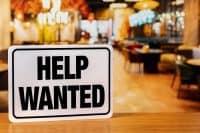
In June of last year, the University of Washington’s Seattle Minimum Wage Study Team released a report on the impact of Seattle’s minimum wage hike through the end of 2015. The previous year the city had adopted a graduated scale to bring Seattle’s minimum wage for certain workers to $15 an hour by mid-2016 and for all workers by 2021.
That report found that the increase from the state’s minimum wage of $9.47 an hour to $11 had only a minimal impact on businesses that rely on low-wage labor and a reduction of about an hour per week for minimum-wage employees. The report did not find “compelling evidence” that the higher minimum wage increased business failure rates.
A new working paper by the University of Washington’s study team posted Monday looked at the effect of a rise in the minimum wage from $11 to $13 an hour in 2016, and the results were different.
The research team found that the second increase in Seattle’s minimum wage reduced the number of hours low-wage employees worked by about 9% while hourly wages increased by about 3%. The result is that total pay for such jobs lowered low-wage employees’ earnings by an average of $125 a month. The new study has yet to be peer-reviewed.
The new study’s results contradict many studies that raising the minimum wage produces benefits for low-wage workers that exceed the damage caused by lost jobs.
Just last week University of California, Berkeley, economists issued a report that found that Seattle’s minimum wage ordinance did, in fact, raise pay for low-wage workers without having a negative effect on jobs. The Berkeley study focused on the restaurant industry where low-wage jobs are common.
Interestingly, the University of Washington study also found little impact on the restaurant industry, but looking at the broader universe of jobs produced the unexpected results.
In a comment on the new study, MIT economist David Autor told FiveThirtyEight:
Nobody in their right mind would say that raising the minimum wage to $25 an hour would have no effect on employment. The question is where is the point where it becomes relevant. And apparently in Seattle, it’s around $13.
It’s Your Money, Your Future—Own It (sponsor)
Are you ahead, or behind on retirement? For families with more than $500,000 saved for retirement, finding a financial advisor who puts your interest first can be the difference, and today it’s easier than ever. SmartAsset’s free tool matches you with up to three fiduciary financial advisors who serve your area in minutes. Each advisor has been carefully vetted and must act in your best interests. Start your search now.
If you’ve saved and built a substantial nest egg for you and your family, don’t delay; get started right here and help your retirement dreams become a retirement reality.
Thank you for reading! Have some feedback for us?
Contact the 24/7 Wall St. editorial team.




